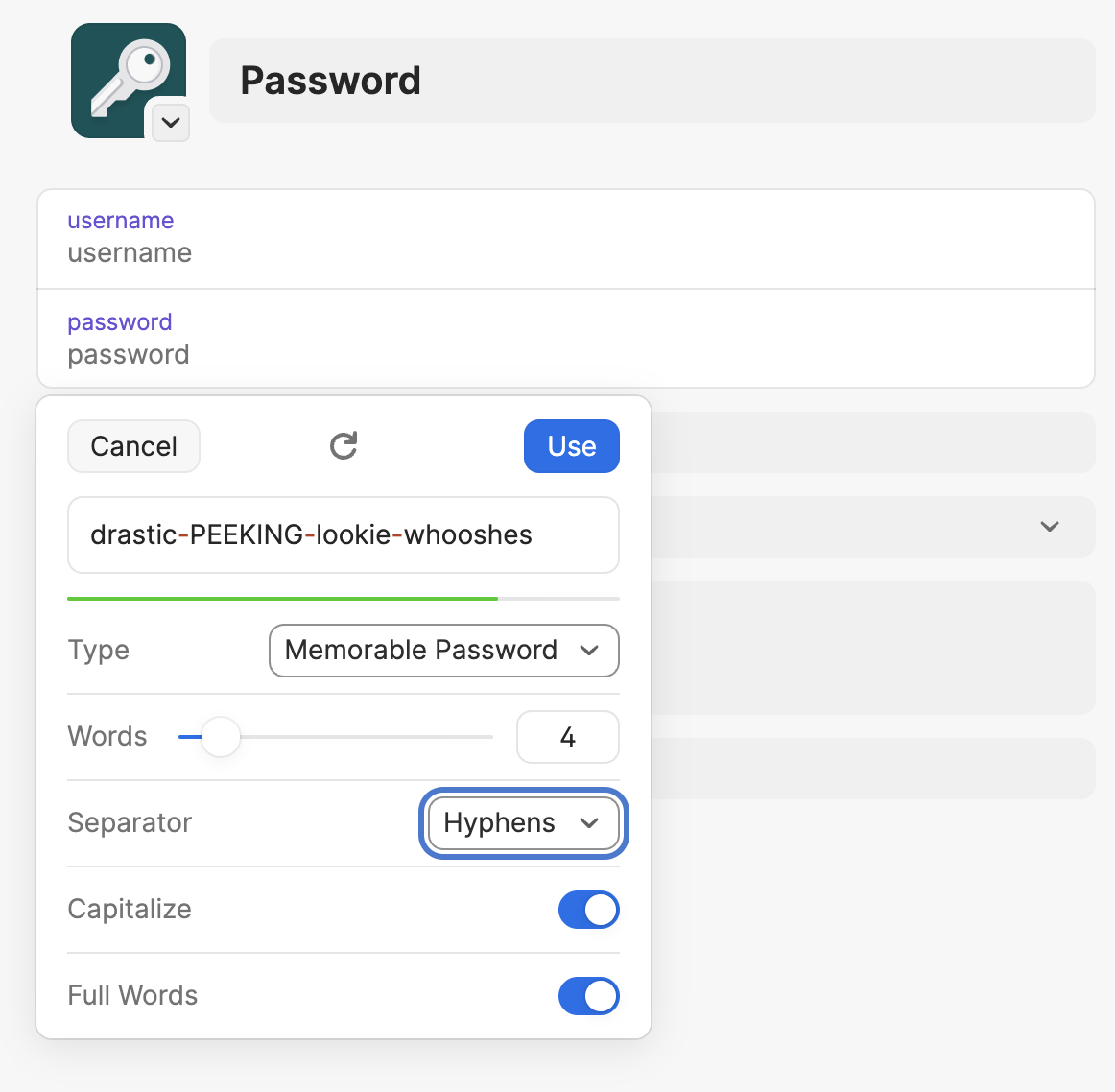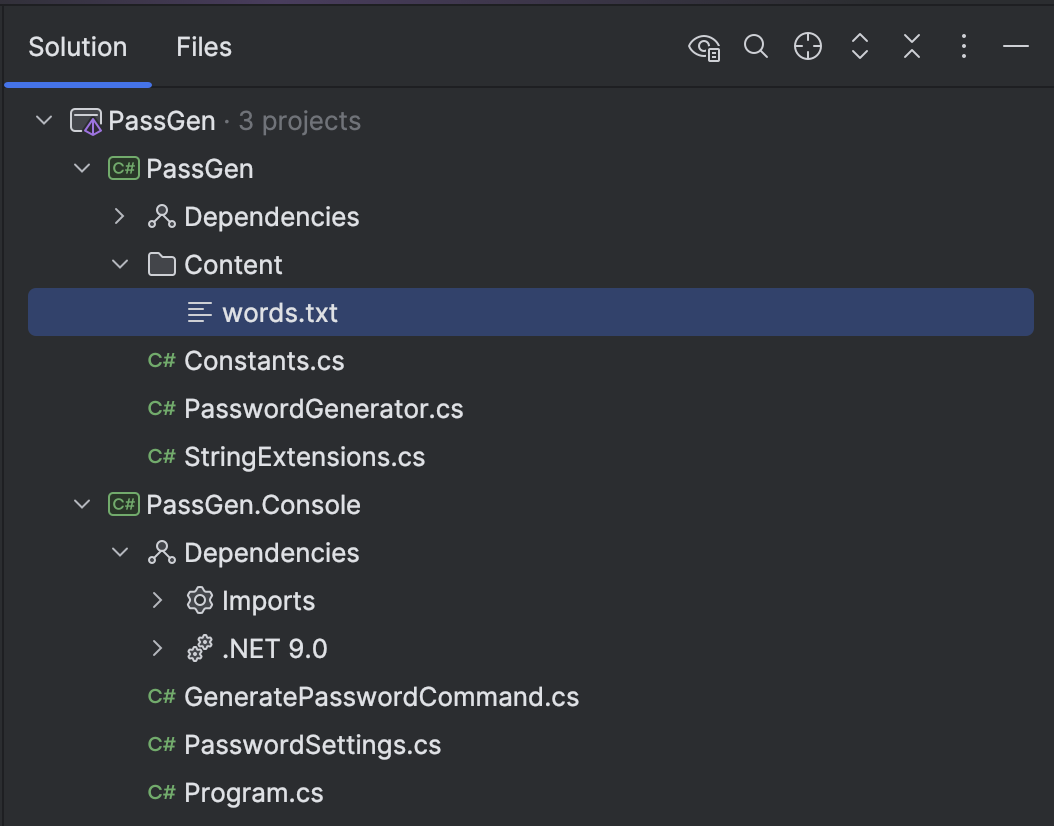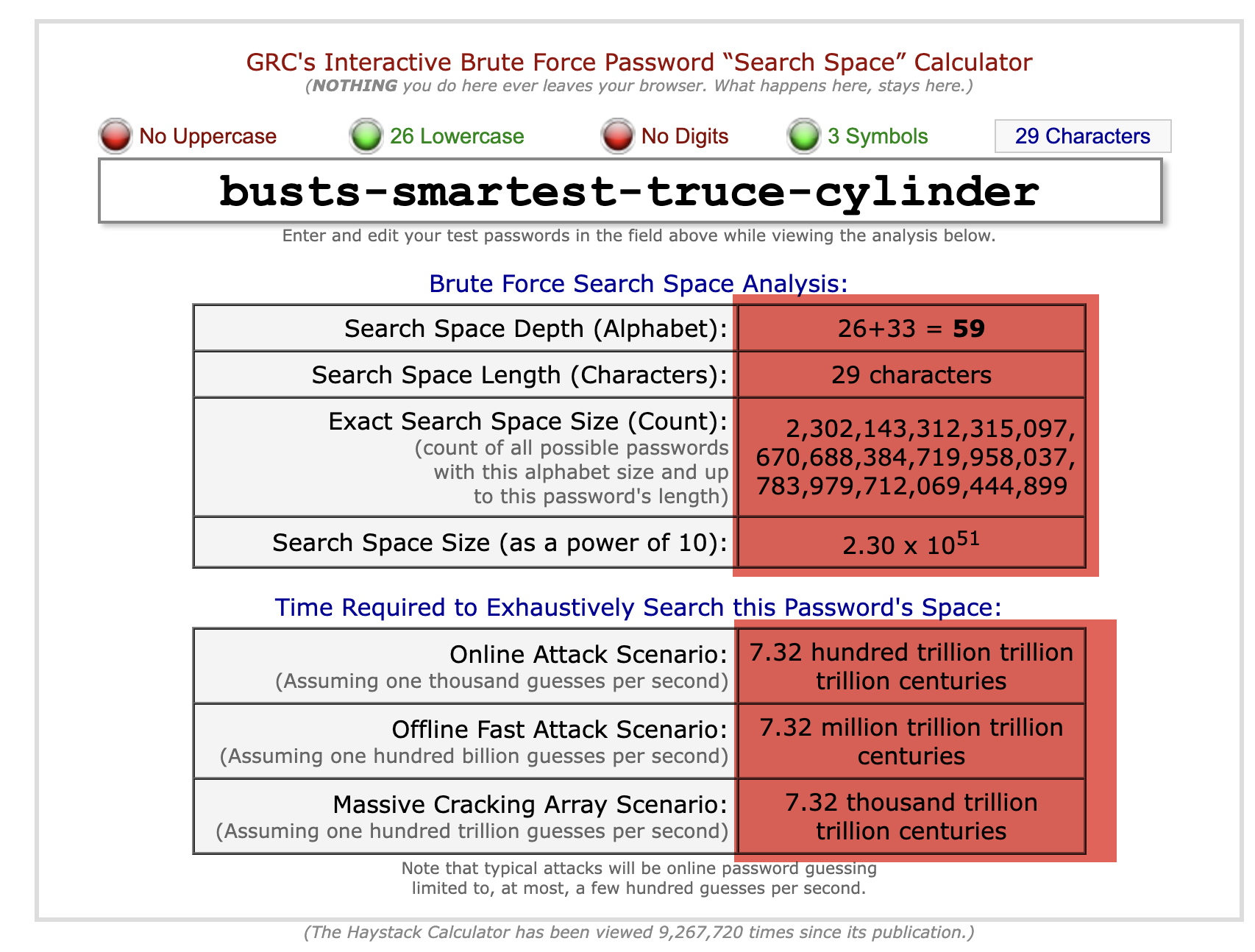Building A Simple Password Generator In C# & .NET - Part 5 - Generating Memorable Passwords
[C#, .NET, StarLibrary, Spectre.Console, OpenSource]
This is Part 5 in a series in which we will build a simple password generator.
In our last post, Building A Simple Password Generator In C# & .NET - Part 4 - Generating Human Readable Passwords, we looked at how to generate human-readable passwords with unambiguous characters.
In this post, we will look at how to generate memorable passwords.
What is a memorable password?
My interpretation is that they are passwords that are relatively easy to remember because they are actual words. What they lack in entropy, they make up for in length.
For this, I am taking inspiration from the excellent 1Password.

The best way to demonstrate is to generate a couple.
busts-smartest-truce-cylinder
dine-observer-poke-models
momma-thrill-life-slap
malibu-proverb-dotted-donovan
wrinkled-topping-wacky-uber
birdie-gall-harris-specs
blow-relish-josh-stomp
plane-woe-cahill-chun
right-inherent-likely-mailed
quantum-foreplay-meddling-ginger
From these, we can see a pattern for each password:
- Four words.
- Hyphen separated.
- Each word is at least
3characters long. - Each word is at most
8characters long.
The capitalize option generates passwords like these:
TAMPERED-sailing-hosted-figure
campaign-PLANNING-huntsmen-prisons
obvious-SOLD-uhm-hilton
rufus-eleanor-THEORY-riviera
peasants-mould-west-CLIMB
It seems to capitalize one of the words in the password.
This should be enough to generate a simple implementation.
The first order of business is to find a list of words.
From this Git archive, there is a list of popular English words.
We can start by :
- Downloading the file.
- Remove all words shorter than
3characters. - Remove all words longer than
8characters.
The following code executes the above.
var client = new HttpClient();
// Download all the words
var allText = await client.GetStringAsync("https://raw.githubusercontent.com/dolph/dictionary/refs/heads/master/popular.txt");
// Split by newline
var allWords = allText.Split(Environment.NewLine)
// Filter by length
.Where(t => t.Length >= 3 && t.Length <= 8);
// Get a temp file name
var file = Path.GetTempFileName();
// Write to disk
File.WriteAllLines(file, allWords);
Console.WriteLine($"Written words to {file}");
We can then include this file in our project, and specify in the .csproj that it is content.
This is my project structure:

And here is the excerpt from the .csproj
<ItemGroup>
<Content Include="Content\words.txt">
<CopyToOutputDirectory>Always</CopyToOutputDirectory>
</Content>
</ItemGroup>
Now, we can add a method to the library to generate the passwords.
We will do the following:
- Pick a random number between
3and 8, four times. - For each of these, randomly pick a word of corresponding length.
Let us start by defining some additional constants, in case we need to adjust our code later.
public const int MemorableWordCount = 4;
public const int MinimumMemorableWordLength = 3;
public const int MaximumMemorableWordLength = 8;
public const char MemorablePasswordSeparator = '-';
Next, we write the code to generate the passwords.
public static string GenerateMemorablePassword()
{
// Temporary list to store generated password elements
List<string> passwords = new List<string>(Constants.MemorableWordCount);
// Load the words from file
var words = File.ReadAllLines("Content/words.txt");
// Create a dictionary with 8 elements
var wordDictionary = new Dictionary<int, string[]>(Constants.MaximumMemorableWordLength);
// Populate the dictionary
foreach (var wordLength in Enumerable.Range(0, Constants.MaximumMemorableWordLength))
{
// Check if the word length is between 3 and 8
if (wordLength >= Constants.MinimumMemorableWordLength)
{
// Query the lines for words of corresponding length, and add to the
// corresponding dictionary entry array
wordDictionary[wordLength] = words.Where(x => x.Length == wordLength).ToArray();
}
else
{
// For 0, 1 and 2, we don't need words of this length. Empty list
wordDictionary[wordLength] = [];
}
}
foreach (var _ in Enumerable.Range(0, Constants.MemorableWordCount))
{
// Get a random number between 3 and 8
var length = Random.Shared.Next(Constants.MinimumMemorableWordLength, Constants.MaximumMemorableWordLength);
// Pick a random word with corresponding length from dictionary
passwords.Add(wordDictionary[length][Random.Shared.Next(wordDictionary[length].Length)]);
}
// Join the elements and return
return string.Join(Constants.MemorablePasswordSeparator, passwords);
}
Finally, we write some tests to verify our functionality.
public void MemorablePasswordsAreGenerated(int count)
{
var password = PasswordGenerator.GenerateMemorablePassword();
_output.Information("Generated password {Count} : {Password}", count, password);
password.Length.Should().NotBe(0);
password.Count(x => x == Constants.MemorablePasswordSeparator).Should()
.Be(Constants.MemorableWordCount - 1);
}
We should see something like this in the console:
[17:13:15 INF] Generated password 0 : native-bisque-goat-cussing
[17:13:15 INF] Generated password 1 : savvy-vote-tat-trio
[17:13:15 INF] Generated password 2 : hoe-hotshot-jag-goober
[17:13:15 INF] Generated password 3 : fury-lithium-were-ess
[17:13:15 INF] Generated password 4 : period-credo-polls-crease
[17:13:15 INF] Generated password 5 : oval-artery-beads-famine
[17:13:15 INF] Generated password 6 : manor-frat-fag-condo
[17:13:15 INF] Generated password 7 : acetate-light-assign-liar
[17:13:15 INF] Generated password 8 : venue-roses-hint-alt
[17:13:15 INF] Generated password 9 : crimson-news-top-outfits
Next, we add support for the capitalization of one of the words, starting by adding a parameter to the GenerateMemorablePassword method.
public static string GenerateMemorablePassword(bool capitalize = false)
{
// Snipped body here
}
Next, the code to capitalize one of the words at random.
// Check if we are capitalizing
if (capitalize)
{
// Pick a random element to capitalize
var index = Random.Shared.Next(0, passwords.Count);
passwords[index] = passwords[index].ToUpper();
}
Finally, some tests to verify our behaviour.
public void MemorablePasswordsAreGenerated(int count)
{
var password = PasswordGenerator.GenerateMemorablePassword();
_output.Information("Generated password {Count} : {Password}", count, password);
password.Length.Should().NotBe(0);
// Check for the separators to be one less than the words
password.Count(x => x == Constants.MemorablePasswordSeparator).Should()
.Be(Constants.MemorableWordCount - 1);
// The password should not have upper case
HasUpperCaseRegex().Match(password).Success.Should().BeFalse();
}
[Theory]
[Repeat(10)]
public void MemorableCapitalizedPasswordsAreGenerated(int count)
{
var password = PasswordGenerator.GenerateMemorablePassword(true);
_output.Information("Generated password {Count} : {Password}", count, password);
password.Length.Should().NotBe(0);
// Check for the separators to be one less than the words
password.Count(x => x == Constants.MemorablePasswordSeparator).Should()
.Be(Constants.MemorableWordCount - 1);
// The password should have upper case
HasUpperCaseRegex().Match(password).Success.Should().BeTrue();
}
// Regex to check string contains upper case characters
[GeneratedRegex("[A-Z]")]
private static partial Regex HasUpperCaseRegex();
Now, if we run our tests for capitalized passwords, we should get results like this:
[17:23:15 INF] Generated password 0 : crusts-accept-SMOOCHY-gush
[17:23:15 INF] Generated password 1 : HORSES-nam-offers-undue
[17:23:15 INF] Generated password 2 : SOY-carcass-book-gib
[17:23:15 INF] Generated password 3 : WAD-panties-shatter-woo
[17:23:15 INF] Generated password 4 : bails-DITCH-arc-trials
[17:23:15 INF] Generated password 5 : eight-hymn-AMAZE-him
[17:23:15 INF] Generated password 6 : zest-POOFY-capital-royally
[17:23:15 INF] Generated password 7 : calls-boggles-SCORING-wiggle
[17:23:15 INF] Generated password 8 : vampire-paw-MOM-tonight
[17:23:15 INF] Generated password 9 : hope-knew-fresh-HANDOFF
We can see one word is being capitalized at random.
You may find of interest one of the decisions here - to perform I/O whenever this GenerateMemorablePassword is called.
Here, there are two main options:
- Have the logic to load the words from disk within the library, and perform this whenever a memorable password is required
- Have the calling application (say, the console UI) perform the I/O and pass the data to the library.
For now, I decided to keep the logic in the library so that it can be used directly without a host application.
How secure are these passwords?
Try this utility from Gibson Research

I think we can conclude that these passwords are pretty secure.
In our next post, we will look at how to wire this implementation to the console application.
TLDR
In this post, we have added support for generating memorable passwords.
The code is in my GitHub.
Happy hacking!